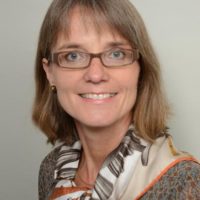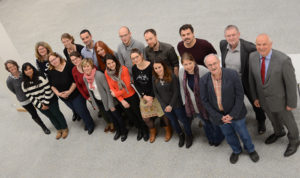December 2016
If there is one country in the world that can call itself multicultural, it must be Luxembourg. With foreign nationals making up nearly half of its population, it’s a fitting place to take a closer look at how people experience this meeting of multiple cultures. Dr Elke Murdock from the University of Luxembourg has been studying the ‘natural multicultural laboratory’ Luxembourg since 2010 and has just published a book focusing on the varying experiences of culture contact in this multicultural context.
Theory and empirical evidence
“At the heart of my research lies the question of how individuals living within a multicultural society experience the meeting of cultures. My research brings together theoretical perspectives and empirical evidence allowing a better understanding whether culture contact situations are considered an opportunity or threat”, Dr Murdock says.
Luxembourg’s borders have been redrawn many times, and within a relative short space of time Luxembourg has undergone a remarkable transformation from a mostly agricultural country with emigration to becoming a modern, industrial target country for immigration. Within Luxembourg the forces of globalization, of looking outward economically and the process of establishing itself as a nation, of looking inward, happened in parallel.
The country’s population and number of nationalities has grown exponentially, plunging people in the Grand Duchy into a wealth of different languages and cultures; but how do we experience this, do we embrace it or do we put our guard up when it comes to applying multiculturalism in society?
“Multiculturalism has become a controversial term”
As Dr Murdock explains, “multiculturalism has become a controversial term. However, we live in increasingly diverse societies and in many countries a movement towards a national discourse can be observed”. Interestingly, the study found that even though many people in Luxembourg do embrace the idea of multiculturalism as a good thing, views change once it comes to embedding different cultures in Luxembourg society. This is also referred to as “principle – implementation gap.”
Dr Murdock adds: “What I did find was that the vast majority of my respondents endorsed the idea of multiculturalism. They express, for example, agreement with the statement that ‘It is good that many different groups with different cultural backgrounds live in Luxembourg’. Broadening the horizon, learning about different customs and perspectives are viewed as positive aspects of living in a multicultural society.”
“However, when it comes to specific forms of living together, agreement is not so strong. For example, less openness was expressed for employing more non-Luxembourgers as teachers or in the police force.”
Varying definitions of nationality
Dr Murdock notes that people perceive nationality in different ways – being born into versus acquired. Her research highlights that “Individuals who believe that one is born into a nationality, find it more difficult to accept that nationalities can be acquired later in life (i.e. dual nationality), and are also less open towards multicultural societies compared to individuals who believe that nations themselves are, in fact, socially constructed.“
“The challenge is to build and foster a more inclusive understanding of nationality. This may be achieved by stressing communalities, rather than celebrating differences. Celebrating differences, as well-meaning as it may be, might actually exacerbate the divide, rather than foster the acceptance of foreigners as fellow citizens.”
Publication
Dr Murdock’s research was published in the Politics of Identity and Citizenship Series by Palgrave Macmillan, UK in November 2016, entitled Multiculturalism, Identity and Difference. Experiences of Culture Contact.
Next step: Adolescents in Luxembourg & national identity
Dr Murdock has secured funding from the FNR CORE programme for her project ‘SWITCH, Subjective Wellbeing and Identity Construal in a Changing World’, she explains: “This will allow me to research and delve deeper into the identity construal processes in multicultural environments. The project focuses on adolescents growing up in Luxembourg, the central question being how adolescents with or without migration background negotiate their national identity in nationally diverse contexts.”
Bringing research to the public
An integral part of Dr Murdock’s work is to communicate her research to the wider public in Luxembourg. This has already taken place in the form of appearances – for example a presentation at the Diversity Day organised by the City of Luxembourg, a parent seminar at the European School of Luxembourg II, and a key note as part of the part of the Luxembourg Evening organized by the Cultural Association of Finland and the Embassy of Luxembourg, Copenhagen in Helsinki, Finland, and most recently Dr Murdock gave a presentation at the The Erwuessebildung (EWB) Luxembourg. These are just some examples to show that research which has an academic impact is also taken back to the Luxembourg community.
About Dr Elke Murdock
Dr Elke Murdock from the INSIDE Research Unit at the University of Luxembourg has been studying multiculturalism in Luxembourg since she was awarded an AFR grant in 2010, supervised by Prof D. Ferring. She successfully defended her AFR PhD ‘Multiculturalism within the Luxembourg Context. A study of individual difference variables influencing attitudes towards the plural composition of society’ in September 2014, receiving the grade ‘excellent’.
After her PhD, Dr Murdock had the opportunity to build on her research and develop new expertise concerning intergenerational value transmission as part of the FNR-funded IRMA project (FNR- C12/SC/4009630 – IRMA – Intergenerational Relations in the Light of Migration and Ageing, Principal Investigator – Dr Isabelle Albert).
Dr Murdock has in October 2016 been awarded CORE funding to continue her work in this domain on the project ‘SWITCH, Subjective Wellbeing and Identity Construal in a Changing World’.
More information
INSIDE research unit (University of Luxembourg)

